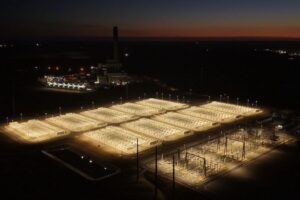Origin Energy’s renewed push into rooftop solar has taken on an interesting perspective: Australia’s biggest electricity retailer appears to be betting that the business solar market will grow sharply, but the household olar market will continue to decline until battery storage costs come down.
A presentation last week by Phil Mackey, the company’s head of new energy, at the Clean Energy Summit in Sydney, says business solar has great potential, because the profile of solar generation works for business and they have less need feed in tariffs. Better data is making it easier to match demand with supply.

“Business solar is in the ascendancy,” Mackey says. He says business now accounts for 30 per cent of the rooftop solar market (below 100kW), up from just 4 per cent in 2013, and predicts the share of the business component will continue to grow.
His predictions for consumer solar is not so great. Origin doesn’t think the household market – boosted by premium tariffs between 2010 and 2013 – will rebound until 2020, which is about when it expects the cost of battery storage to fall far enough to become a mass market commodity and trigger the next wave of consumer solar investment.
That prediction accords with the views with most in the “big utility” sector of the market. Everyone agrees, as Mackey suggested, that battery storage is now an “early adopter” market. Its offering include the Tesla Powerwall. “The residential battery storage market is ticking along,” Mackey says, “but payback is slow.”
The question for all in the industry is how quickly those costs will fall and when it will become a mass market proposition. Morgan Stanley has suggested costs will fall 40 per cent in the next two years, making it an attractive proposition at that point.
It says utilities are not prepared for this, and the shift to storage is likely to happen four times quicker than the incumbent industry anticipates.
But the issue is complicated by the lack of industry data. All estimates of installations to date are purely anecdotal, and range from 2,000 to 30,000 (grid connected). Unlike solar, battery storage is not subsidised, so there is no official data collection.
In the meantime, Origin says rooftop solar is paying dividends to businesses, who it says can cut their electricity costs by half, as indicated in the graph below.

The advantage to Origin – and other retailers – is that it can lock in customers for up to 15 years with power purchase agreements. The longer the contract, the bigger the discount offered.
Interestingly, Origin says its PPAs – where customers pay nothing for the solar system – now account for three quarters of small business installs, which is even higher than the US market, considered the home of the solar PPA.
It says many businesses are attracted to solar, but simply don’t have, or don’t want to spend, the upfront capital on such systems, even if it means bigger savings on energy bills in years to come.







